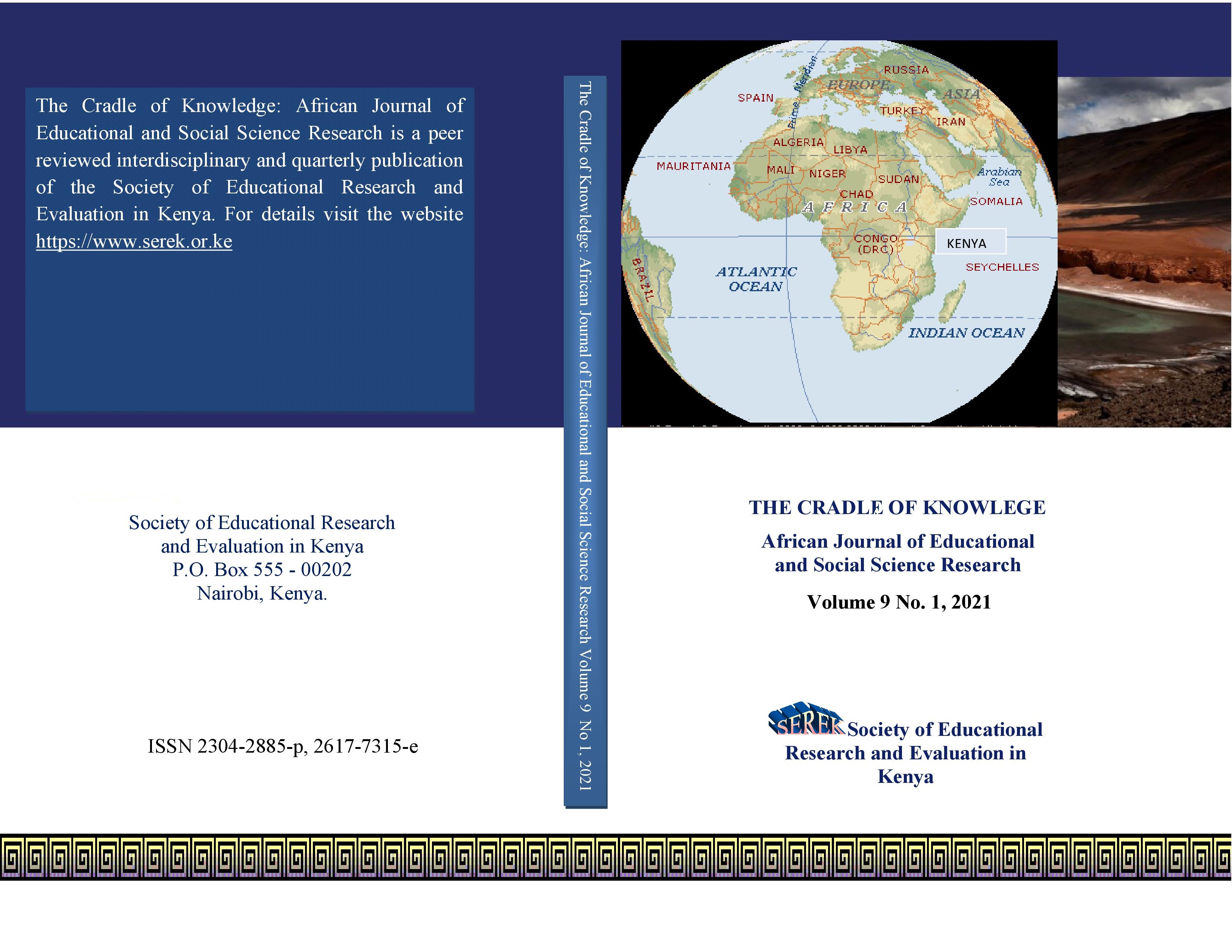
Virtual Teaching and Learning Paradigm Shift Implications on Access, Equity and Quality in Higher Education in Kenya
Abstract
Higher education is the lifeblood at the heart of every nation’s development owing to its fundamental role in social, political and economic development. In this regard the accessibility and quality of the education delivered to the youths will determine whether we are to compete globally or not. Notwithstanding this significant role, higher education has been confronted with many challenges. The COVID-19 catastrophe being the most recent challenge has triggered swift and unprecedented distraction across higher learning institutions, impacting learners and lecturers. Consequently, institutions of higher education had no option but to abruptly engage use of information and communications technology (ICT) to deliver their programs online as part of their immediate instructional and institutional response measures. These initiatives however noble have laid bare the digital divide among institutions of higher learning particularly the African continent. This then pauses a question on how higher education institutions in Africa, Kenya inclusive deal with the quality, inequities, access and other challenges arising from the abrupt widespread use of virtual teaching and learning? It is on this pretext that this theoretical study seeks to interrogate Virtual Learning and Teaching Paradigm Shift Implications on Access, Equity and Quality in Higher Education. This theoretical study will be grounded on the Classical Liberal Theory of Equal Opportunities advocated by Sherman and Wood. The study is vital as it is envisaged that the insights will enable universities identify areas in access and delivery of online education that create and reinforce educational inequalities and provide solutions to eliminate such disparities.
Key words: Virtual, Access, Equity, Quality Learning & Teaching.
Full Text:
PDFReferences
Awidi, T. (2008). Developing an e-learning strategy for public universities in Ghana. EDUCAUSE Quarterly Magazine, Volume 31, Number 2.
Blinco, K., Mason, J., McLean, N. and Wilson, S. (2004). Trends and issues in e-learning infrastructure development: A White Paper for alt-i-lab. Prepared on behalf of DEST (Australia) and JISC-CETIS (UK).
Eden Dahlstrom, D. Christopher Brooks &Jacqueline Bichsel (2014). The Current Ecosystem of Learning Management Systems in Higher Education: Student, Faculty, and IT Perspectives. Research report. Louisville, CO: ECAR, September 2014. Available from http://www.educause.edu/ecar
Ford, D.M. (2007). Technologizing Africa: On the Bumpy Information Highway. Computers and Composition, 24, 3, 302-316.
Global Internet Usage (2013). International Telecommunications Union.
http://en.wikipedia.org/wiki/International_Telecommunications_Union.
Goolam Mohamedbhai, (2020) COVID-19: What consequences for higher education?
https://www.universityworldnews.com/post.php?story=20200407064850279
Gilbert Nganga, Maina Waruru and Gilbert Nakweya, (2020). Universities face multiple challenges in wake of COVID-19 closures https://www.universityworldnews.com/post.php?story=20200407162549396
Hattie, J. A (2012). Visible Learning for Teachers. Maximizing Impact on Learning. London. UK. Routledge.
Hollow, D., & ICWE (2009). E-Learning in Africa: Challenges, priorities and future direction. Retrieved from http://www.gg.rhul.ac.uk/ict4d/workingpapers/Hollowelearning.pdf
Kamba, M. A. (2009). Problems, challenges and benefits of implementing e-learning in Nigerian universities: An empirical study. International Journal of Emerging Technologies in Learning, 4(1), 66–69.
Kasse, J. P., & Balunywa, W. (2013, February). An assessment of e-learning utilization by a section of Ugandan universities: Challenges, success factors and way forward. Paper presented at the International conference on ICT for Africa 2013, Harare, Zimbabwe.
Kenya Vision 2030 (2007). A Globally Competitive and Prosperous Kenya:
https://www.opendata.go.ke/download/jih3-amby/application/pdf
Kim, Y. and Baylor, A.L. (2006). Pedagogical Agents as Learning Companions; the role of agent Competency and type of Interaction. Educational Technology Research and Development. 54 (03).
Manduku, J. Kosgey, A. & Sang, H. (2012) Adoption and use of ICT in enhancing management of public secondary schools: A survey of Kesses zone secondary schools in Wareng District of Wasin Gishu County, Kenya. Available at: http://www.iiis.org/cds2012/cd2012sci/eista_2012/paperspdf/ea069vm.pdf (Accessed on November 15, 2014).
Mpofu, V., Samukange, T., Kusure, L. M., Zinyandu, T. M., Denhere, C., Huggins, N.,Sithole, F. (2012). Challenges of virtual and open distance science teacher education in Zimbabwe. International Review of Research in Open and Distributed Learning, 13(1), 207-219. Retrieved from
http://www.irrodl.org/index.php/irrodl/article/view/968/2083
Ndume, V., Tilya, F. N., & Twaakyondo H. (2008). Challenges of adaptive e-learning at higher learning institutions: A case study in Tanzania. International Journal of Computing and ICT Research, 2(1), 47–59.
NESC (2007). Kenya Vision 2030: A globally competitive and prosperous Kenya. National Economic and Social Council of Kenya.
O’Keefe, L., Rafferty, J., Gunder, A., Vignare, K. (2020, May 18). Delivering high-quality instruction online in response to COVID-19: Faculty playbook. Every Learner Everywhere.
Patrick Otieno Lumumba, (2020) Higher education – The lifeblood of development
https://www.universityworldnews.com/post.php?story=20200526102859360
Romiszowski, A. (2004). How’s the E-learning Baby? Factors Leading to Success or Failure of an Educational Technology Innovation. Educational Technology, 44, 1, 5-27.
Salmon, G. (2004). E-moderating: The key to teaching and learning online. (2nd ed.). Oxfordshire: Taylor & Francis Books Ltd.
Sife, A.S., Lwoga, E.T. and Sanga, C. (2007). New Technologies for Teaching and Learning: Challenges for Higher Learning Institutions in Developing Countries. International Journal of Education and Development Using ICT, 3, 2, 57-67.
Ssekakubo, G., Suleman, H. and Marsden, G. (2011). Issues of Adoption: Have E-Learning Management Systems Fulfilled their Potential in Developing Countries? In EJISDC (2015) 66, 4, 1-14
Tarus, J. (2011). Adoption of e-learning to support teaching and learning in Moi University. Thesis presented in partial fulfillment of the requirements for the degree of Master of Philosophy (Information Technology), Moi University.
Utsumi, Y. (2005). Connect the World official launch. Available at
http://www.itu.int/partners/pdf/SG_preso.pdf (Accessed on January 17, 2013).
Vygotsky, L. (1978). Mind in society: The development of higher psychological processes. Cambridge, MA: Harvard University Press.
Walimbwa, M. (2008). Integrating e learning in teaching and research in upcoming East African regional Universities. Paper presented at the meeting CNIE Banff, Alberta, Canada. Retrieved from
http://www.slideshare.net/Walimbwa/elearning-in-east-african-universities
Wondwosen Tamrat & Damtew Teferra (2020). COVID-19 poses a serious threat to higher education https://www.universityworldnews.com/post.php?story=20200409103755715
Refbacks
- There are currently no refbacks.

This work is licensed under a Creative Commons Attribution 4.0 International License.
SEREK publication https://serek.or.ke
This work is licensed under a Creative Commons Attribution 4.0 International License